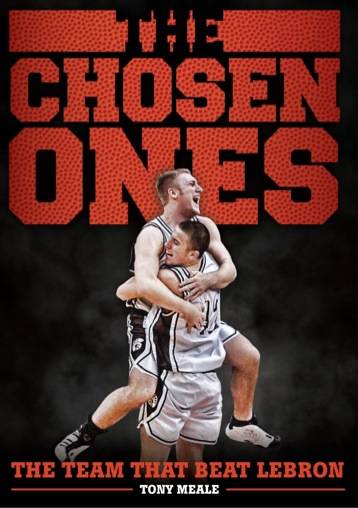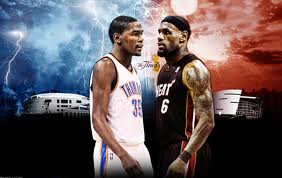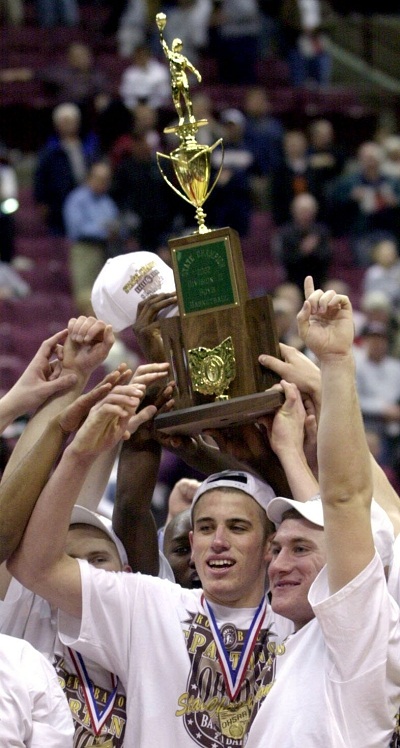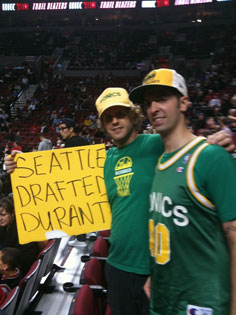
 Part one of my series about the Tony Meale book "The Chosen Ones: The Team that Beat LeBron" was posted yesterday. In part two, I submitted a series of questions about being an author and publisher, Roger Bacon and LeBron James.
Part one of my series about the Tony Meale book "The Chosen Ones: The Team that Beat LeBron" was posted yesterday. In part two, I submitted a series of questions about being an author and publisher, Roger Bacon and LeBron James.
"The Chosen Ones" can be purchsed at www.thechosenonesthebook.com.
DI: What was the research process like for the book? I'd like to know about what it was like securing interviews with everybody and hunting down video archives.
TM: The research process was a lot easier than it could have been. Roger Bacon tapes all of its games, so getting copies of the state final and whatnot was fairly simple. One of the players on the cover, Matt Reed, has an amazing scrapbook from that season with every newspaper clipping from every relevant newspaper you could imagine. That saved a lot of time. As far as interviews, some people were harder to track down than others, but a few phone calls and emails usually did the trick. Interviewing the players and coaches was obviously important, but I wanted to go beyond that and get as many perspectives as possible from that game and that season. An example would be interviewing the referees from the state final. I was able to track down two of the three and just wanted to see what their recollections were – of LeBron, of Roger Bacon, of the game itself.
DI: It is obvious that you had paid a lot of attention to detail while writing "The Chosen Ones." What was the most difficult aspect of writing the book?
TM: The most difficult aspect, by far, was not being an eye witness to what happened. I sort of pulled a Buzz Bissinger in that I left my newspaper job to write a book, but Buzz moved to Odessa to write Friday Night Lights and got to witness firsthand every high and every low of every player and coach on that team. And it shows in the writing. You're talking about maybe the greatest sports book of all time. I was only 16 when Roger Bacon won state. I wasn't at the game, and even if I had been, I wouldn't have been taking notes. I wouldn't have been in the locker rooms or present for any of the behind-the-scenes stuff that can potentially add so much to a book.
DI: What was the most fun aspect?
TM: As much as I would have loved being there for the practices and pregame speeches and postgame celebrations, it was really rewarding to sit down with those guys one-on-one and to listen to them tell their story and share their recollections. Most of the time, people were sharing memories from five to ten years earlier, but there were times when it was 25 to 30. Over time, the mind gets a little fuzzy, but it's amazing how much the memories aligned from person to person. Some people might read the book and think, "Did things happen exactly the way they're being portrayed? Is this quote from a decade ago verbatim to what was actually said?" And those are fair questions. But truthfully, I think the memories make the book special. When you really get down to it, what's more important: the way something happened, or the way someone remembers it happening? The memories are what people take with them.
DI: "The Chosen Ones" was the first book you ever wrote. What did you take away from the process? Do you have any advice for aspiring authors who might want to take the plunge?
Read more...
 Last season's NBA Finals will go down as the greatest of all time strictly because of the circus it was, and the palooza it became. The weight of the world was on LeBron James, and not just on him, but geared against him. It propelled what I consider to be the height of the internet era as we knew it and represented the pinnacle of social connectivity. It was Tebowmania and Linsanity before Tebowmania and Linsanity existed. The media and any person with blogging capabilities turned LeBron into a self conscious puppet. He had fueled a beast when he left Cleveland and we returned the favor. Admittedly, it was a really fun time to be a sports fan, and really, it had little to do with James' propensity to wilt under pressure and the supposed joy people derived from seeing this. Rather, it was the fact that we were the honorary observers of a full blown drama. It was un-comparable to anything we had ever seen in sports.
Last season's NBA Finals will go down as the greatest of all time strictly because of the circus it was, and the palooza it became. The weight of the world was on LeBron James, and not just on him, but geared against him. It propelled what I consider to be the height of the internet era as we knew it and represented the pinnacle of social connectivity. It was Tebowmania and Linsanity before Tebowmania and Linsanity existed. The media and any person with blogging capabilities turned LeBron into a self conscious puppet. He had fueled a beast when he left Cleveland and we returned the favor. Admittedly, it was a really fun time to be a sports fan, and really, it had little to do with James' propensity to wilt under pressure and the supposed joy people derived from seeing this. Rather, it was the fact that we were the honorary observers of a full blown drama. It was un-comparable to anything we had ever seen in sports. 



 Part one of my series about the Tony Meale book "The Chosen Ones: The Team that Beat LeBron" was
Part one of my series about the Tony Meale book "The Chosen Ones: The Team that Beat LeBron" was  On the day that Stony Brook university and Kent State University punched their cards to the College World Series, Tony Meale released his book “The Chosen Ones: The Team that Beat LeBron.” The 372 page book chronicles the improbable run by Roger Bacon Spartans that ended in a defeat of LeBron James and St. Vincent St. Mary in the 2002 state title game.
On the day that Stony Brook university and Kent State University punched their cards to the College World Series, Tony Meale released his book “The Chosen Ones: The Team that Beat LeBron.” The 372 page book chronicles the improbable run by Roger Bacon Spartans that ended in a defeat of LeBron James and St. Vincent St. Mary in the 2002 state title game.  As we try to keep our mind on our own goals, we know there are plans for the future, but certainly not the immediate future. Positively consumed by the events of the present day, fans of the Cleveland Cavaliers and even casual observers around Northeast Ohio cannot look past these NBA Finals. For some, it's a crusade to never let go of the bitter, but for many it's a time to move forward. Then again, it might just be about watching some quality basketball before the Association takes its summer hiatus.
As we try to keep our mind on our own goals, we know there are plans for the future, but certainly not the immediate future. Positively consumed by the events of the present day, fans of the Cleveland Cavaliers and even casual observers around Northeast Ohio cannot look past these NBA Finals. For some, it's a crusade to never let go of the bitter, but for many it's a time to move forward. Then again, it might just be about watching some quality basketball before the Association takes its summer hiatus.
